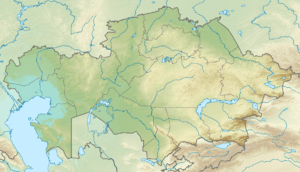Lake Burabay
Burabay (Kazakh: Бурабай көлі, Burabaı kóli; Russian: Боровое, Borovoe) is one prominent lake of a group of lakes that share the same name in northern Kazakhstan, located in the Burabay District of Akmola Region, in the eastern foothills of Kokshe Mountain.
| Burabay | |
|---|---|
 Burabay Location in Kazakhstan | |
| Location | Akmola Region, Kazakhstan (near Kokshetau) |
| Coordinates | 53°04′30″N 70°16′30″E |
| Primary inflows | River Sary Bulak, Imanaevskii Stream |
| Primary outflows | River Kurkureuk |
| Max. length | 4.5 km (2.8 mi) |
| Max. width | 3.9 km (2.4 mi) |
| Surface area | 11 km2 (4.2 sq mi) |
| Average depth | 3.4 m (11 ft) |
| Max. depth | 7 m (23 ft) |
| Water volume | 164 km3 (0 cu mi) |
| Salinity | 0.1-0.15% |
| Shore length1 | 13.6 km (8.5 mi) |
| Surface elevation | 320.6 m (1,052 ft) |
| Islands | 1 (Zhumbaktas) |
| Settlements | Burabay |
| 1 Shore length is not a well-defined measure. | |
Naming
The shores of the lake are overgrown with pine forest. The name of the lake originates from the word bor, which means "pine forest". The historical name is Auliekol, which means "holy lake". The water in the lake is limpid and the bottom can be seen clearly. The water surface of the lake is almost open, only the western and northwestern shores are rushy; the southern shores are rocky, and the eastern shores are sandy. The bottom is flat.[1]
The lake has several capes. Near the northwestern cape, there is a rocky mushroom-shaped island, Zhumbaktas ("Sphinx"), reaching an elevation of 20 metres (66 ft) above the water. Burabay is separated by mountain ranges from the closest lakes. The cliffs and capes of the northwestern and southern coasts create a unique landscape.[2]
The lake is situated within Burabay National Park. The lake water is healing. On the eastern shore, there is the Burabay medical resort and the Nature Museum (Kazakh: Табиғат мұражайы).
In literature
The Kazakh writer Zhanaidar Musin, in his book «Жер шоктыгы Кокшетау» (Almaty, 1989), called Lake Burabay "Kumuskol", which means "silver lake". The nature of Burabay is proclaimed in Saken Seifulin’s poem “Kokshetau”:
Burabay water’s more limpid than dew
One cannot withhold admiration its view.
Its shore’s overgrown with glorious trees
Magnificent pines, white birches make scenery splendid indeed.
References
- "Burabay National Nature Park :: Kazakhstan nature reserves. Kazakhstan recreation zones". www.kazakhstan.orexca.com. Retrieved 2016-07-12.
- "Borovoe main website".